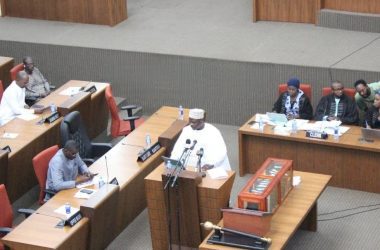By Frederic Tendeng
Andrew Burns, a senior economist at the Research Department of the World Bank, on Thursday made a prediction of Senegal’s economic growth rate between the 2010 and 2011. Burns who was speaking through a videoconference as he presented the 2010 report on the Global Economic Prospects (GEP) to journalists from francophone African countries, said that Senegal’s economy is expected to rise from 3.4% to 4.2%. The report he co-authored stresses that though the sub-Saharan African area seriously suffered from the recent economic crisis, there are indications that the impact was less effective than in other regions. ‘‘Compared to previous external shocks, the macroeconomic fundamentals have improved in many countries of this region,’’ Mr Burns said. The Bank’s senior economist explained that “trade, foreign direct investment, tourism, remittances and official development assistance’’ were the first areas affected by the crisis. ‘‘Indeed, prospects for the African region remain uncertain and the strength of the recovery will depend largely on the demand that should come from key export markets,’’ he said. ‘‘Although the prices of agricultural products have fallen by 22% from the peak reached in June 2008, they nevertheless remain almost twice as high as the lows achieved earlier this decade, which may have a direct incidence on the household incomes.’’ Andrew Burns recalled in his report that “many households are likely to devote a significant portion of their income on food, or simply reduce their food consumption”. He noted that for many African countries the growth is far below the 6% rate scored during the years of economic boom which is due to the declining real terms prices of commodities and the slower global growth. Mamadou Ndione, a World Bank Economist in Dakar, pointed at tourism and remittances from Senegalese expatriates as the most affected factors in Senegal’s national economy. And the trend, he said, has not reversed during the year. As mentioned in the report, “the growth rate for fragile African states will turn around 4.2%, while the low income countries will experience a growth rate that is close to 4.8%. As for South Africa, the expected growth is 2% by this year as compared to 1.8% for last year. The middle income countries will experience a growth acceleration which may be up to 3.5%”. Meanwhile, the World Bank experts believe that the global financial crisis has seriously jeopardized the achievement of the Millennium Development Goals by 2015.
Trending :
- 14 hours ago
- Lawyer Martin Calls For President Adama Barrow’s Removal
- 14 hours ago
- Gambia’s Midyear Budget: Revenue Jumps But Deficit Remains
- 14 hours ago
- Assan Martin Warns Gambian Politicians: “Political Suicide Awaits The Ambitious”
- 16 hours ago
- Vendors Struggle As Serekunda Market Relocation Presents New Challenges
- 2 days ago
- GPA Staff Sent Home Over Multi-Million Dalasi Financial Scandal But…




